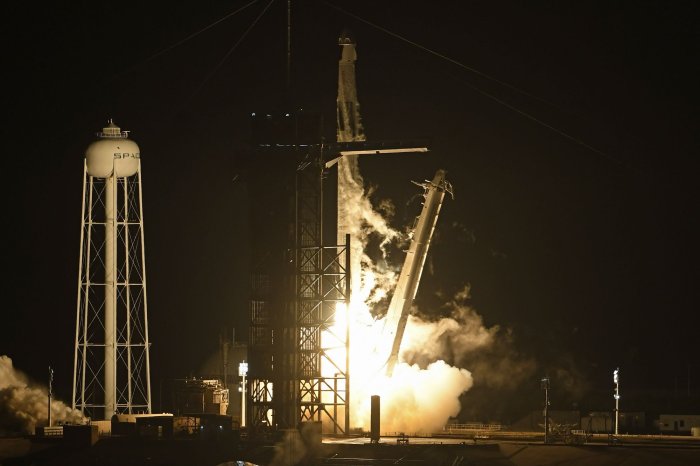1 of 5 | The Axiom-1 crew is set to launch to the International Space Station as the first group of private astronauts to stay aboard the off-planet outpost. Photo courtesy of SpaceX
ORLANDO, Fla., April 1 (UPI) -- SpaceX plans to test-fire a Falcon 9 rocket on Monday ahead of its first private astronaut mission, Axiom-1, to the International Space Station.
The test, dubbed a static fire test, is a routine part of prelaunch procedures.
All nine of the Falcon's Merlin 1D engines will briefly fire up as the rocket is held firmly to the launch pad. The ignition will enable engineers to ensure that the rocket's systems are ready to launch.
If the test goes as planned, SpaceX will attempt to launch the Axiom-1 mission on Wednesday.
This particular mission differs from the typical crewed launches in that it will transport four private citizens, not NASA astronauts, to the orbital outpost for a first-of-its-kind 10-day mission.
Retired NASA astronaut Michael López-Alegría will be joined by an international crew: Larry Connor, a real estate and technology entrepreneur; Mark Pathy, a Canadian businessman; and Eytan Stibbe, an Israeli entrepreneur and former fighter jet pilot.
Liftoff is set for 12:05 p.m. EDT, with the spacecraft docking with the ISS at about 2:45 a.m. EDT on April 8.
Space tourists have previously traveled to the orbital outpost, hitching rides on Russian Soyuz rockets, but this will be the first time an all-civilian, commercially funded crew will fly to the ISS onboard a SpaceX Crew Dragon.
The crew, which were trained and selected by Axiom Space, has spent more than 1,000 hours training for the mission. According to the crew, this is what sets them apart from traditional space tourists.
"We're officially designated as private astronauts in the eyes of NASA," Connor said during a news briefing on Friday. "We've had to pass a lot of rigorous tests to meet all the professional astronaut standards."
Axiom President and CEO Mike Suffredini said the crew will spend eight days on the space station, with full access to the U.S. side.
They will perform a variety of research investigations, including health-related studies that will provide scientists back on Earth with even more data about how spaceflight affects the human body.
This mission is the first of many expected to come and represents the first footsteps into a broader commercial space world.
As NASA prepares to retire the ISS after 2030, the agency is looking to companies like Axiom to set up their own space stations in low-Earth orbit so the agency can branch further out into deep space, to destinations like the moon and Mars.
Axiom is planning at least four missions to the ISS, with the first two confirmed by NASA. It also plans to send its first commercial module to the station in 2024, with more hardware to follow.
López-Alegría said he is looking forward to returning to space. As a NASA astronaut, he flew on four space missions, including one on a Russian Soyuz.
"Being away from NASA for 10 years and sharing my experiences with new friends and colleagues has given me a greater appreciation for how special [those experiences] were," he said during Friday's briefing.
"To be able to experience [space] one more time is almost like waking up and going back into a dream."
The SpaceX Falcon 9 rocket launches NASA's third crew to the International Space Station at 9:03 p.m. November 10 from the Kennedy Space Center in Florida. Photo by Joe Marino/UPI |
License Photo
















